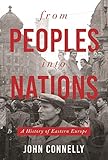From peoples into nations a history of Eastern Europe John Connelly
Material type: TextLanguage: English Publisher: Princeton Oxford Princeton University Press [2020]Copyright date: © 2020Description: viii, 956 Seiten Illustrationen, Karten 24 cmContent type:
TextLanguage: English Publisher: Princeton Oxford Princeton University Press [2020]Copyright date: © 2020Description: viii, 956 Seiten Illustrationen, Karten 24 cmContent type: - Text
- ohne Hilfsmittel zu benutzen
- Band
- 9780691167121
- 943.7 dc23
- DJK38
- FINNUG
- NK 1950
- NK 6710
- 15.61
- 15.74
- 15.72
- 15.70
- BfZ
| Item type | Current library | Collection | Call number | Status | Notes | Date due | Barcode | |
|---|---|---|---|---|---|---|---|---|
 single unit book
single unit book
|
HAC Library - Holdings of the American Academy in Berlin HAC – 1st floor – Library Room – Open Stacks | F (Affiliated) | F:DJK38 .C64 2020 (Browse shelf(Opens below)) | Available | Hardcover | 2024-0011 |
Enthält Literaturangaben und ein Register
"This book is a history of East Central Europe since the late eighteenth century, the region of Europe between German central Europe and Russia in the East. Connelly argues the region, for which it is frequently hard to define exact boundaries and which is sometimes treated country-by-country in a way seemingly separate from the broader trends of European history, was one of shared experience despite most of the peoples being divided by linguistic, geographic, and political barriers. Beginning in the 1780s, an unwitting Habsburg monarch -- Joseph II -- decreed that his subjects would use only German, as he hoped to mould a common nationality using German over the disparate subjects. Instead, he unleashed the energies and struggle for the emergence of new nations that pitted small peoples armed with an idea against empires. The author argues that the underlying national self-assertion which emerged under imperial rule in the eighteen and nineteenth centuries shows deep connections to subsequent histories, to the creation of nation states of the regions after World War I, the failure of democratic rule in these states during the interwar years, the submersion of the region under Nazi then Soviet rule after 1939, and to the reinvention of sovereign states (and then the break up of two of them) after 1989. The book interconnects major themes and country histories for first time, chronicling this diverse region over many generations, from the time of Joseph, through democratic and socialist revolutions, genocide and Stalinism, through civil society movements struggling for liberal democracy, into our own day, when illiberal politicians come to power by exploiting very old fears."--
Archivierung/Langzeitarchivierung gewährleistet SLG BfZ pdager DE-24
There are no comments on this title.
